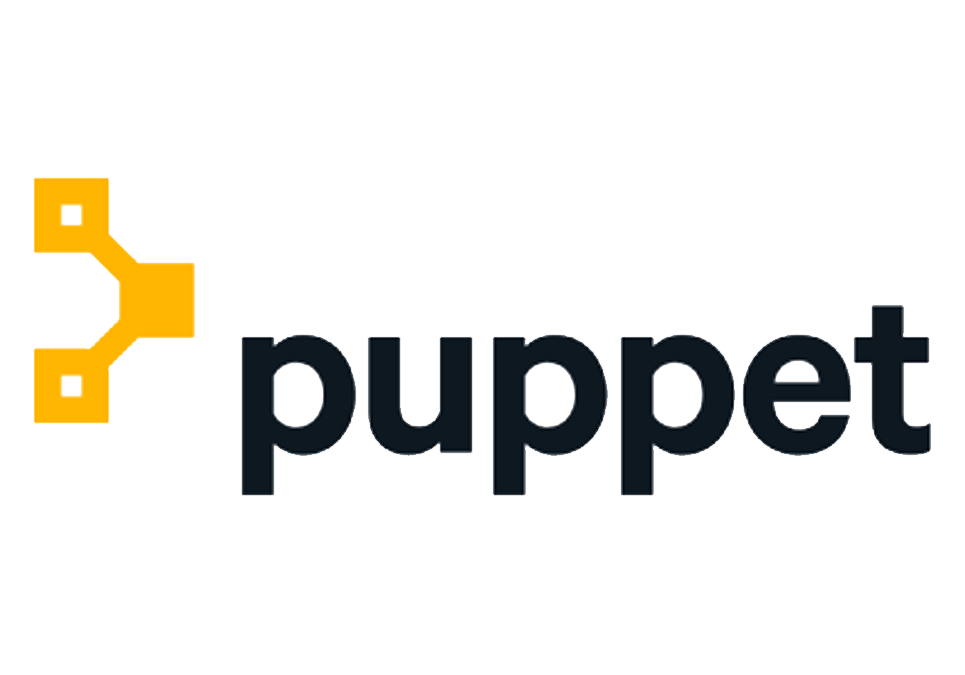- Call us: +1 (469) 756-6329 | +91 7004 215 841
- Email: info@devopsconsulting.in
Puppet Training
ABOUT
Puppet Training at devopsconsulting.in provides an in-depth exploration of Puppet, a powerful configuration management tool essential for automating and managing IT infrastructure. This training is designed to help participants master the core concepts of Puppet, including its architecture, language, and best practices for implementing automation solutions. Participants will learn how to write and manage Puppet manifests, define custom modules, and integrate Puppet with various systems and environments. The course covers advanced topics such as managing node configurations, utilizing Puppet’s reporting features, and troubleshooting common issues. With a focus on hands-on practice, the training ensures that professionals can effectively deploy and manage Puppet in their environments, leading to streamlined operations and consistent infrastructure management.

This Puppet essentails course teaches you a best-practice approach to managing infrastructure using Puppet IT automation software in order to maximize the benefits of the Puppet Module Architecture. Puppet Enterprise is used for all exercises and labs, but the concepts that are taught in the course apply equally to Puppet’s Open Source solution. After completion of this course, you will be able to deploy basic system configurations using best practices for Puppet in a Master-Client setup.
COURSE OBJECTIVES
The course objectives for Puppet Training at devopsconsulting.in are designed to provide participants with a comprehensive understanding of Puppet and its role in configuration management. By the end of the training, attendees will:
- Understand Puppet Fundamentals: Gain a thorough understanding of Puppet’s architecture, components, and how it integrates with various IT infrastructure elements.
- Develop Proficiency in Puppet Language: Learn to write and manage Puppet manifests and modules using Puppet’s declarative language to define system configurations.
- Implement Automation Solutions: Acquire skills to automate the configuration and management of infrastructure, ensuring consistency and efficiency across environments.
- Configure and Manage Nodes: Learn to effectively manage and deploy configurations to multiple nodes, including using Puppet’s node classification and role-based approaches.
- Utilize Puppet Modules and Classes: Explore the creation and usage of Puppet modules and classes to encapsulate and reuse configurations.
- Leverage Reporting and Troubleshooting: Develop the ability to use Puppet’s reporting tools to monitor system states and troubleshoot issues to maintain a healthy infrastructure.
- Integrate Puppet with CI/CD Pipelines: Understand how to integrate Puppet with Continuous Integration and Continuous Deployment (CI/CD) pipelines to enhance automation workflows.
PRE-REQUISITES
Before enrolling in Puppet Training at devopsconsulting.in, participants should meet the following pre-requisites to maximize the effectiveness of the course:
- Basic Knowledge of IT Infrastructure: Familiarity with fundamental IT infrastructure concepts, including servers, networks, and operating systems, is essential for understanding Puppet’s role in configuration management.
- Experience with Command Line Interfaces: Proficiency in using command line interfaces, particularly in Linux/Unix environments, is necessary for navigating and performing tasks during Puppet configurations.
- Understanding of Scripting Languages: Basic knowledge of scripting languages such as Bash or Python will be beneficial, as it helps in writing and understanding Puppet manifests and automation scripts.
- Familiarity with Version Control Systems: Experience with version control systems like Git will assist in managing and tracking changes to Puppet configurations and modules.
- Exposure to Configuration Management Concepts: Prior exposure to general configuration management practices or tools will help in grasping Puppet’s concepts and applications more effectively.
FEATURES
- 30 Hours instructor led online class
- Hands on Approach - We emphasize on learning by doing.
- Life time free re-enrollment to future DevOps courses
- Life time free access to all learning materials including
- Class recordings
- Presentations
- Sample Code
- Projects
- Total Lab Infrasture in cloud and 24x7 available
- 70% of the class is consist of Lab
- Each week assignments(total 4) with personal assistance
- Two real time senario based projects with standard evaluation
- 24x7 online support to queries during and after the course completion
- 1 dedicated class for Interview preparations
AGENDA
The basic course program is outlined here:
The Basics
- Introduction To Configuration Management
- About The Author
- Why Puppet?
- How To Access Your Working Files
The Puppet Infrastructure
- Puppet Agents
- Puppet Masters
- MCollective And Systems Orchestration
- Cross Platform Puppet
The Puppet Run Cycle
- Introduction To Puppet Run Cycle
- Gathering System Facts
- Node Matching And Catalogue Compilation
The Puppet Language - A Basic Primer
- Puppet Resources - How To Define System Resources
- Applying A Simple Puppet Manifest
- Puppet Types
- The Package File Service Patter
- Applying Conditional Logic In Puppe
- Fact Conditionals - Choosing A Course Of Action
Organizing A Puppet Environment
- Defining Nodes
- Puppet Modules - Reusable Code
- Provisioning A Web Server
- Class Parameters - Applying Variables
- Hiera Parameters - Defining Variables
- Executing Modules Against A Puppet Master With An Agent
- Reporting With Puppet
MCollective
- MCollective And Live Management
- MCollective With Puppet
- Using MCollective To Interact With Services
- Using MCollective To Interact With Puppet
Additional Tools
- Managing Modules With Librarian-Puppet
- Managing Directory Environments And Modules With R10K
- External Node Classifiers And Reporting With Puppet Dashboard - Part 1
- External Node Classifiers And Reporting With Puppet Dashboard - Part 2
Conclusion
- Wrap-Up And Further Resources



|
|---|
